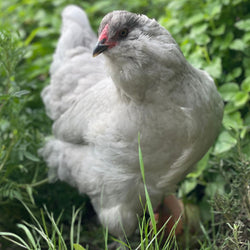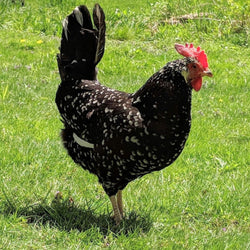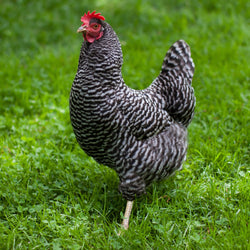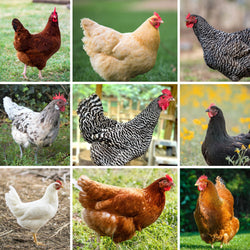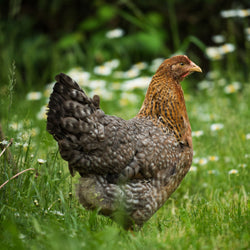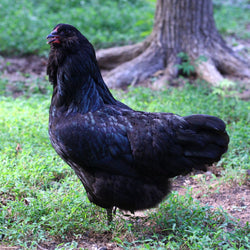page=12/--
Frequently Asked Questions
Here we answer the most commonly-asked questions about ordering, chicken care, and more.
Do you offer vaccinations for bantams?
Guess what? Now we do! For over a decade we didn't because we felt the bantams were too tiny to withstand the vaccine, but the equipment has improved! We're happy to announce that starting in 2021, all chicks we sell are able to be vaccinated for Marek's disease.
Read MoreHow can I help my young children understand the wait to have our baby chicks delivered?
There are a few things you can do together to help ease the frustration of waiting! One thing you can do with a child when waiting something out is to make a construction paper chain with the number of links equalling the number of days you must wait. Take a link off each day. Alternatively, you could simply mark days off on a calendar. Weekly, you can devise some task to do together related to the coming chickens. For instance, one task could be picking out brooder equipment, or finding a good place for it in your home. Another task...
Read MoreWhat are the signs of mites or lice and how do I treat my birds if they have an infestation?
Mites and lice are a common problem for chickens and can be carried in by wild birds, so keep that in mind. That means that if you have an infestation, it doesn't necessarily mean your management practices are bad. Don't get overwhelmed by guilt! There are some things that you just can't control...and birds landing in your trees or walking in your yard is probably one of them. Signs of parasite infestation in your flock's feathers Mites inhabit your birds' feathers and suck their blood: they're like fleas, lice, or mosquitoes that live in your hair---yuck! Infestations of feather mites...
Read MoreMy chicken has a lump or tumor on her chest--what should I do?
You are probably seeing your chicken's crop. A chicken's crop is a part of her digestive system, and is located on her breast. You can see it in the illustration below, closest to the front. When it fills up with food, it may stick out a little bit. It will be smaller in the morning before she has eaten, and larger after she is full. The crop (or "craw") holds food before it goes further down their digestive tract. Chickens basically store food in their crops; it is like a chicken lunchbox. Then it moves into the stomach or proventriculus...
Read MoreWhy are my chickens' egg whites cloudy?
Cloudy whites in a farm egg are usually indicative of its freshness. The cloudiness is caused by dissolved carbon dioxide in the white, which eventually escapes through the shell in older eggs. If the white of the egg is greenish, that usually means there is too much riboflavin in the diet. Make sure they are getting balanced nutrition. Eating acorns, shepherds purse or some types of weeds can cause that greenish tinge, too. Pinkish whites are caused by some types of weeds a chicken may get into, or high quantities of cottonseed meal in the diet.
Read MoreWhy are the whites of my chickens' eggs watery?
Usually the whites of very fresh eggs such as you may gather from your own flock will be very thick in comparison to what you may be used to seeing at the grocery store! However, watery whites can be caused by a number of things. Eggs that are old will have watery whites (this is usually why grocery store eggs are so thin and tasteless). High ammonia levels in the coop can cause watery whites, too, as can high temperatures. These are other reasons factory farmed eggs are usually not very good: the conditions chickens experience in places like that...
Read MoreWhy did my chicken lay a shell-less egg?
A shell-less egg is a strange sight! You might think a shell-less egg would look like a cracked egg: a mess of white and yolk soaking into nesting material. But actually, an egg without a shell is often intact. Even an egg without a shell has that soft membrane. You might even think it's a regular egg until you touch it! Chickens need a lot of calcium to create good, hard shells, so most incidences of shell-less eggs in an adult hens are related to not having enough calcium in the diet. Young hens may lay a shell-less egg or...
Read MoreWhat does the word "broody" mean?
When a hen is broody, that means she wants to hatch her eggs and raise chicks. A breed known for frequent broodiness has hens that often, individually go broody. These hens may not even need eggs to set on to be broody--they may brood in a nest with no eggs. Or in a corner on rocks. Further, if there ARE eggs in the nest, if there is not a rooster in your flock, your hens will not know that their eggs won't be fertile. Your hen will seem to be in a sort of bad temper while she broods, she...
Read More







"The Clubhouse" Coop
Easy to assemble and built to last, the Clubhouse Coop is the perfect starter coop for a small flock.

